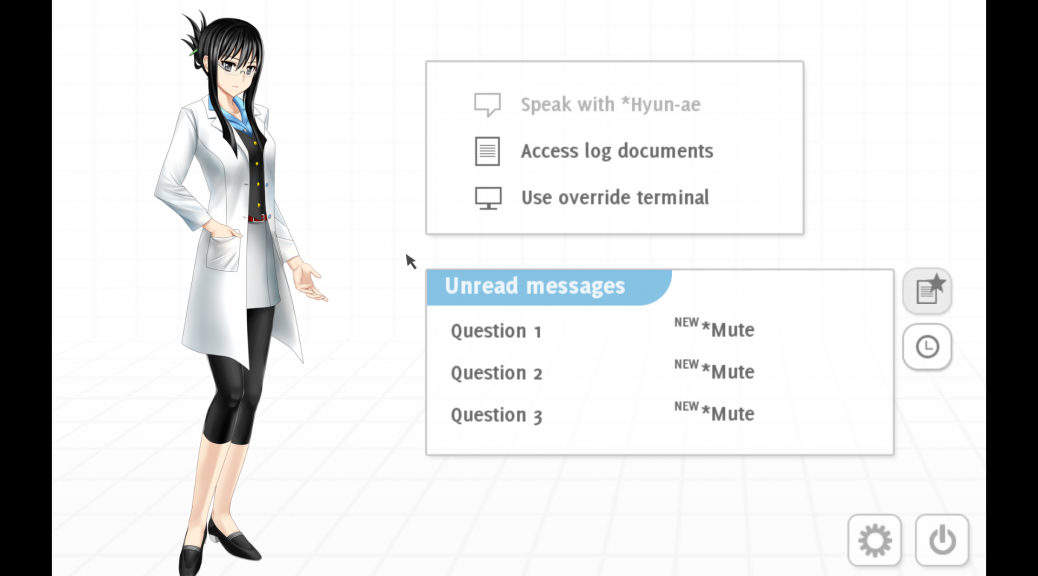Analogue: A Hate Story is a visual novel created by Christine
Love. I played it on Steam.
It spawned a sequel, Hate Plus. I would not call Analogue: A Hate Story a game, it’s an interactive narrative. I
won’t get into the whole game/not a game debate right now, but my definition of
a game requires a failure state, and there is no way to fail with Analogue: A Hate Story. It’s a strong
narrative in the form of an interactive computer terminal, so I feel
“interactive narrative” is the appropriate term.
The narrative revolves around a
generational space ship, the Mugunghwa,
that was lost hundreds of years ago. It was recently rediscovered and you are
sent to make contact with the ship to find out what happened. Your ship
approaches the generational ship and opens computer communication. Via your
computer link with the ship, you access the crew logs to find out what happened
to make the ship lose contact and why there is no one alive on board.
The interactive elements are very
basic. You can interact with the ship AI to gain access to additional journal
entries and logs or you can use the computer interface to try to unlock other
information about the ship. The experience is mostly one of reading the story. As
you read the journal entries you gain a better understanding of the life and
times of the people who lived aboard the ship. It is a very interesting way to
peek into the personal thoughts of people, peeling back the veneer of civility they
put on and seeing what they really think on the inside. The developer takes the
smart and interesting route of staggering the order in which the journal
entries are unlocked, which alters and influences how the truth of events are
revealed. At some times you see one person’s opinion then that of another
person on the same issue, other times you only get to see one side of the story
for a while until you have formed an opinion on the issue only to find there
are big holes in your understanding of what happened when other entries are
revealed. It is a very interesting method of storytelling akin to reading a
mosaic-style novel.
My biggest issue with the
narrative was that it presented the thoughts and feelings of many people aboard
the ship that I felt to be misogynistic and small-minded. The inclusion of said
viewpoints was deliberate, as the society living aboard the spaceship is meant
to be reflective of Korea’s Joseon Dynasty, a period during which women in that
country were treated quite brutally. This historical analogue serves as a sharp
contrast to the modern-minded protagonist, who is at first bewildered and, at
intervals, increasingly frustrated with the attitudes of those around her. I
would have felt better about the story if the most egregious offenders with
these small-minded views had come to learn the errors of their ways over time. However,
I understand that is largely my projection of what I would want from the game,
but, as in real life, many people never learn from their mistakes.
In the end, there is massive
comeuppance for the denizens of the Mugunghwa.
Though some may say it is a bit extreme, it’s largely a matter of opinion. At
the end of the story, having read all available entries, I found that I enjoyed
getting to peek into the lives and personal thoughts of lots of different
people. The most interesting part of the journals is that most entries are from
people within the same family. Given this, not only do you get to see the
thoughts and feelings of one person about the rest of the family, but then get
to see the thoughts and feelings from the other members of the family about
that first writer.
The games retails for $9.99 USD
on Steam; I purchased it for $1.99 USD during a Steam sale. The main story
takes 3 hours to finish, and then entire story and all achievements can be
obtained in 6 hours. However, if you just tab through all the entries without
reading them, the story can be completed in under 10 minutes, but that would be
pointless since the entire point of this interactive narrative is story.
Recommendation: Medium-Low. There is no gameplay, it is only
narrative. My main complaint is enjoyment. I did get some enjoyment from the
story, but not enough to warrant recommending this narrative. Something to note
is that I am completely fine with interactive narratives, and there are a
number of them I have quite enjoyed, but I simply did not enjoy this one enough
to recommend. It is a decently interesting story, however, I was often
frustrated at the viewpoints of some of the journal entries. I cannot recommend
the game for its list price of $10 USD. $2 USD would be the most I would
suggest paying for this experience, if you decide to try it.










No comments :
Post a Comment